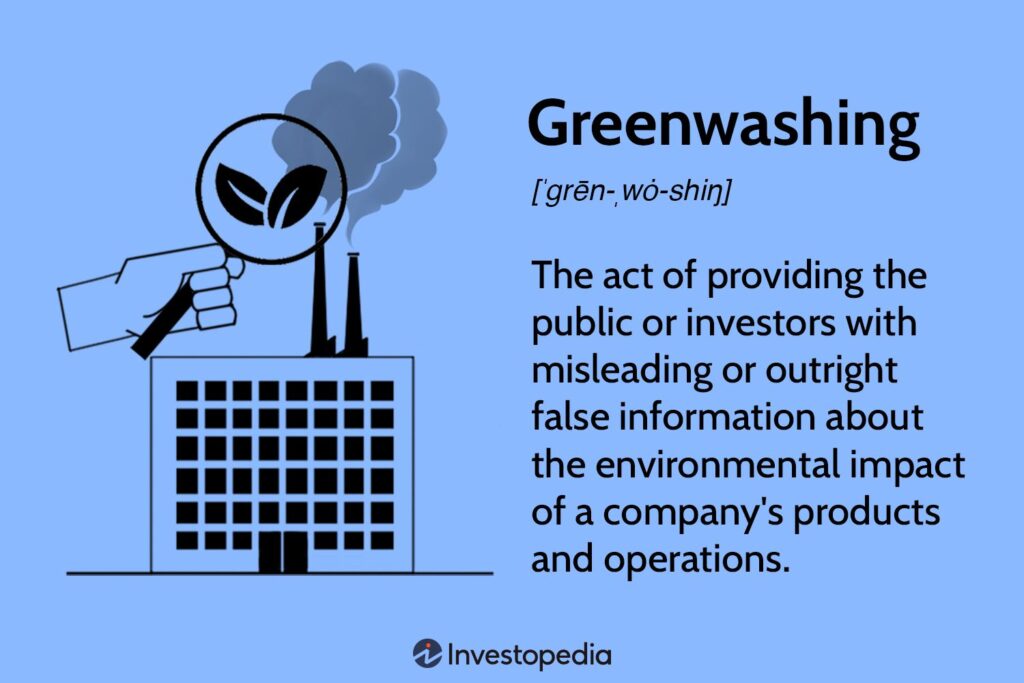What is Greenwashing?
Before diving in – what is greenwashing exactly? Greenwashing is a marketing tactic where a company or organization makes false or misleading claims about the environmental impact of its products, services, or policies. The goal is to mislead consumers into thinking that the company is more environmentally friendly than it actually is.
Greenwashing can be harmful to the environment and can delay or distract from concrete action on climate change. It can also mislead consumers who want to buy products that are not harmful to the planet
The term itself has become synonymous with corporate deceit—a shorthand for companies making big environmental promises they can’t (or won’t) keep. It’s easy to point fingers and assume it’s all driven by greed. But what if I told you it’s not that simple?
Earlier this week, I came across an educational infographic about greenwashing. It was insightful, and it inspired me to write a post about “why it’s so easy for corporations to deceive people.” Then I stopped and deleted it. Something about that message felt incomplete, oversimplified.
Because, in truth, greenwashing isn’t always intentional. It’s not always the product of corporations trying to pull the wool over people’s eyes. More often than not, it’s a symptom of something deeper – a fractured system, misaligned incentives, and organizational chaos that stifles real progress.

From my 10 years in the boardroom as a Sustainability Executive, here’s why I believe greenwashing happens—and why it’s not just about greed.
1. The Sustainability Echo Chamber
Sustainability Advisors (Chief Sustainability Officer, Climate Director) are surrounded by a system that inadvertently stifles their progress:
- CFO: “What’s the ROI? What’s the cost?”
- Legal: “What are the liabilities or risks in this messaging?”
- COO: “I won’t disrupt operations unless it cuts costs.”
- Marketing: “We need 7 articles, a podcast, and a viral storyline—yesterday.”
5 briefs and 3 months later, the conversation is all but forgotten to everyone but the Chief Sustainability Officer (CSO). Result? Corporate sustainability becomes a slow-moving relay race with no baton handoff. By the time real progress could be made, deadlines loom, and there’s mounting pressure to deliver a compelling message to the public.

2. Reporting Fatigue and Bureaucratic Chaos
Sustainability reporting is a beast. Frameworks like CDP, GRI, SASB, and TCFD demand an overwhelming amount of data—sometimes requiring companies to answer over 3,000 questions just to comply. Enter reporting fatigue.
Add to this the realities of corporate silos:
- Each department holds its own piece of the data puzzle.
- Reporting deadlines are looming, but the coordination required to gather accurate, up-to-date data feels impossible.
And then there’s competitor pressure. Public sustainability reports look like major progress, but data gaps, benchmarks, and spin hide what’s truly happening. When other companies publish polished reports claiming major progress, it creates a perception that everyone is racing ahead.
No company wants to be seen as lagging behind. The reporting race pressures sustainability teams into prioritizing a compelling storyline over actionable results. CSOs often have no choice but to compile existing data—sometimes outdated or incomplete—into an “impactful” annual report.
So, what happens? CSOs and their teams are often left to piece together what they can. They compile existing data—sometimes incomplete, outdated, or unverified—into an annual report that highlights the good, downplays the bad, and fits neatly into a compelling narrative.
The Result? The pressure to produce an impactful storyline often outweighs the pressure to produce actionable results. It’s not that the company doesn’t care—it’s that the system isn’t designed to allow them to keep up and be fully transparent at the same time.

3. The Human Factor: Miscommunication and Misalignment
Let’s get some perspective:
- Executives aren’t evil villains—they’re working within systems that value short-term wins.
- CSOs get caught in a “middle ground”: they’re held accountable for progress, but lack decision-making authority.
The problem isn’t a lack of commitment. It’s a lack of:
- Too many conflicting priorities and an inability to effectively triage.
- Internal alignment across teams.
- Tools to track and measure progress in real time.
- Timelines that reflect the complexity of implementing meaningful change.
Sustainability professionals and business leaders alike need to work together to rebuild the frameworks, processes, and incentives that can drive real progress. The sustainability world doesn’t just need better reporting – it needs better systems.


